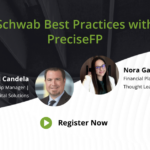In the cutthroat world of finance, standing out is key to snagging new clients and expanding your business.
Believe it or not, your current clients might just be your golden ticket. Research says people are 400% more likely to jump on board when a friend sends them your way—yet 11% of financial advisors bother to ask for referrals. If you’re smart about it, nailing down a referral program could mean a steady stream of new clients.
Crafting a killer referral program doesn’t have to be rocket science (thankfully since you’ve got enough on your plate). Here are three tips for cooking up an effective referral game plan as a financial advisor:
Keep It Simple
A referral program doesn’t need to be overly complex. You and your clients (and potential clients) are busy; honor their time with a simple referral program that is just as effective as a complicated and costly program.
Start by considering how you communicate with clients. Is it mainly through texting, emailing, or the phone? Then, create a simple way for clients to share referrals with you through those channels. Here are a few options:
- Set up a texting number specifically for referrals where clients can send you their friends’ and family members’ contact information.
- Create an email address just to collect referrals. It can even automatically forward to your main email account so you see updates as they come in.
- Print cards where clients can write their referrals and leave them in the office when they come for meetings.
- Set up a specific voicemail account for people to call in their referrals.
- Create a new page on your website with a simple form to collect referral information. You can share the URL with clients through email, social media, or a scannable QR code.
No matter what channel you use, be sure that it’s something your clients are already using. If no one comes in for in-person meetings, don’t waste time printing physical cards. If most of your clients are nearing retirement, don’t create a flashy website they won’t use.
Ask!
As simple as it may be, the most successful referral programs start by simply asking for referrals. If you’ve done a good job working with your current clients, they likely have people around them who could benefit from your services — they might even have people in mind already. But life gets busy, and if you don’t proactively ask for referrals or let clients know you’re looking to grow your firm, they might not pass on the information.
Let your clients know you’re always looking for referrals. You can send an email or add it to your client newsletter or email signature. It doesn’t need to be elaborate, but make sure clients know you are open to and excited about referrals.
Make It Worth Their Time
And then there’s the reward part of it. Referral programs are two-sided. By giving you information about a potential client, your current clients expect something in return. People are more willing to participate when you offer a reward or incentive and make it worth their time.
First, you’ll need to consider the second part: What constitutes a referral? Having clients give you the contact information of your friends and family is one thing; turning it into a sale is something else entirely. What constitutes a successful referral? Is it getting someone to come in for a consultation, having them sign up for a new account, or keeping their account open for six months? Establish thresholds of when your clients will earn their incentives. Again, it doesn’t need to be complicated, but it does need to be clear. Consider your goals: If you want to build your brand and spread the word about your firm, reward clients for referrals that lead to meetings. If you want to expand your client base, save those rewards for new clients who open accounts.
There’s no one way to make referrals worth your clients’ time. It could be a gift card, service discount, or entry into a larger drawing. Again, think about what matters to your clients. If your target market is entrepreneurs, they may want to earn a discount with a business or marketing coach. If you work mostly with wealthy people or retirees, perhaps a vacation prize is best. Get feedback from your clients and ensure your rewards still keep your firm in compliance.
When a client refers someone to you, it’s important to boost their ranking in your system. Even if they don’t have a lot of assets with you, their effort in bringing in new prospects should be acknowledged. Consider giving them a higher status and rewarding their loyalty. Surprise rewards are always a great way to show your appreciation and keep them motivated.
Consider PreciseFP’s new peer referral program as a practical example. With this initiative, you can earn a $100 gift card for each successful referral you make. New users benefit from special onboarding and discounts, showcasing how an effective referral program delivers mutual benefits and supports growth.
To maximize the success of your own referral program, put in some front end thought and blueprint your client and referral experience. This includes:
- Developing an email workflow sequence for referrals, referees, and general promotion.
- Crafting branded, easy-to-use referral forms and possibly a landing page.
- Promoting your program with eye-catching social media content and having in-person conversations.
Bottom line: Setting up a solid referral program is totally worth it.
Harnessing the trust and satisfaction of your current clientele can pave the way for a steady influx of high-quality leads. If you’re ready to elevate your client acquisition strategy, consider exploring PreciseFP. Take advantage of our complimentary trial to experience firsthand how it can enhance your practice’s growth.










